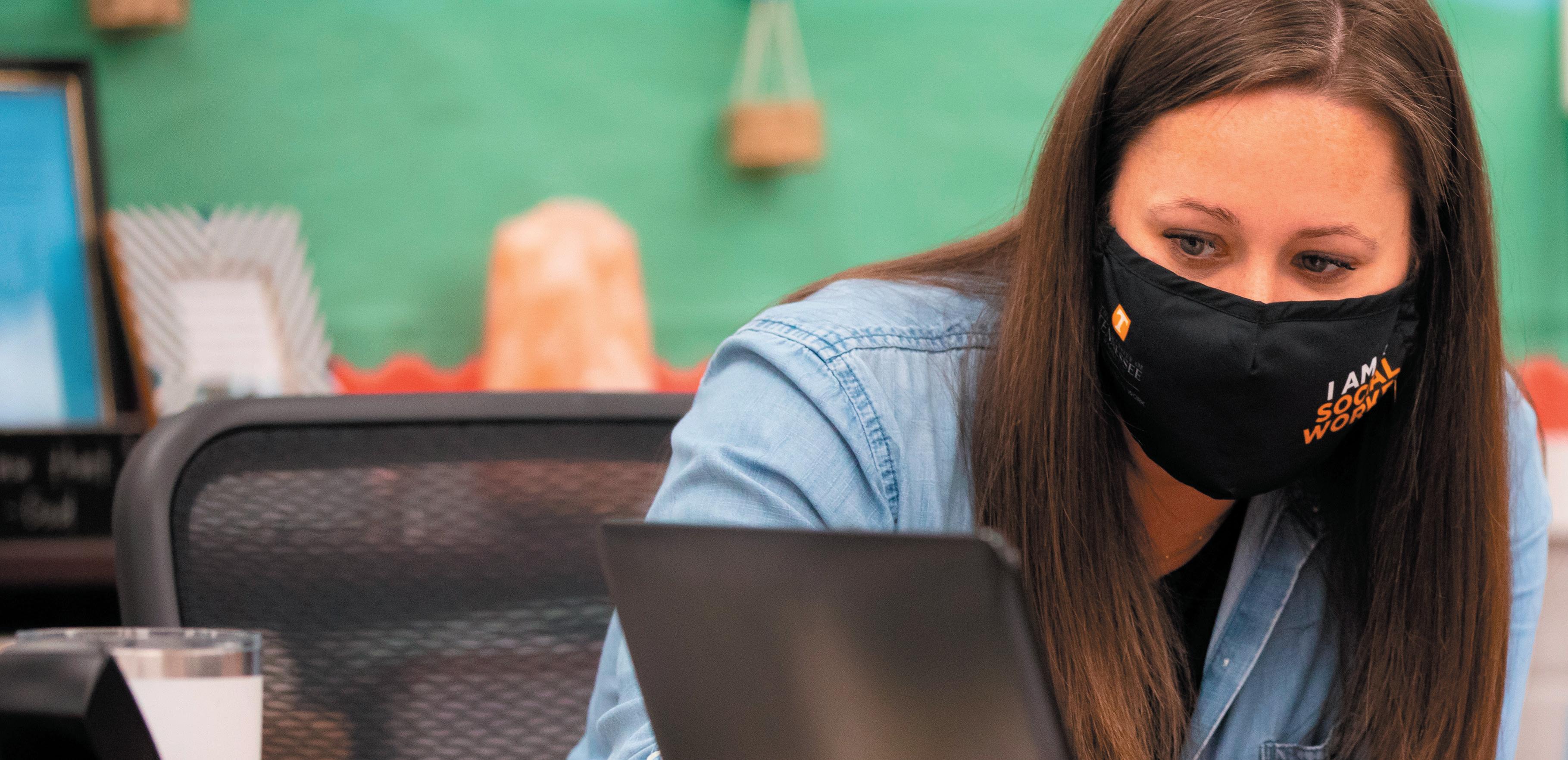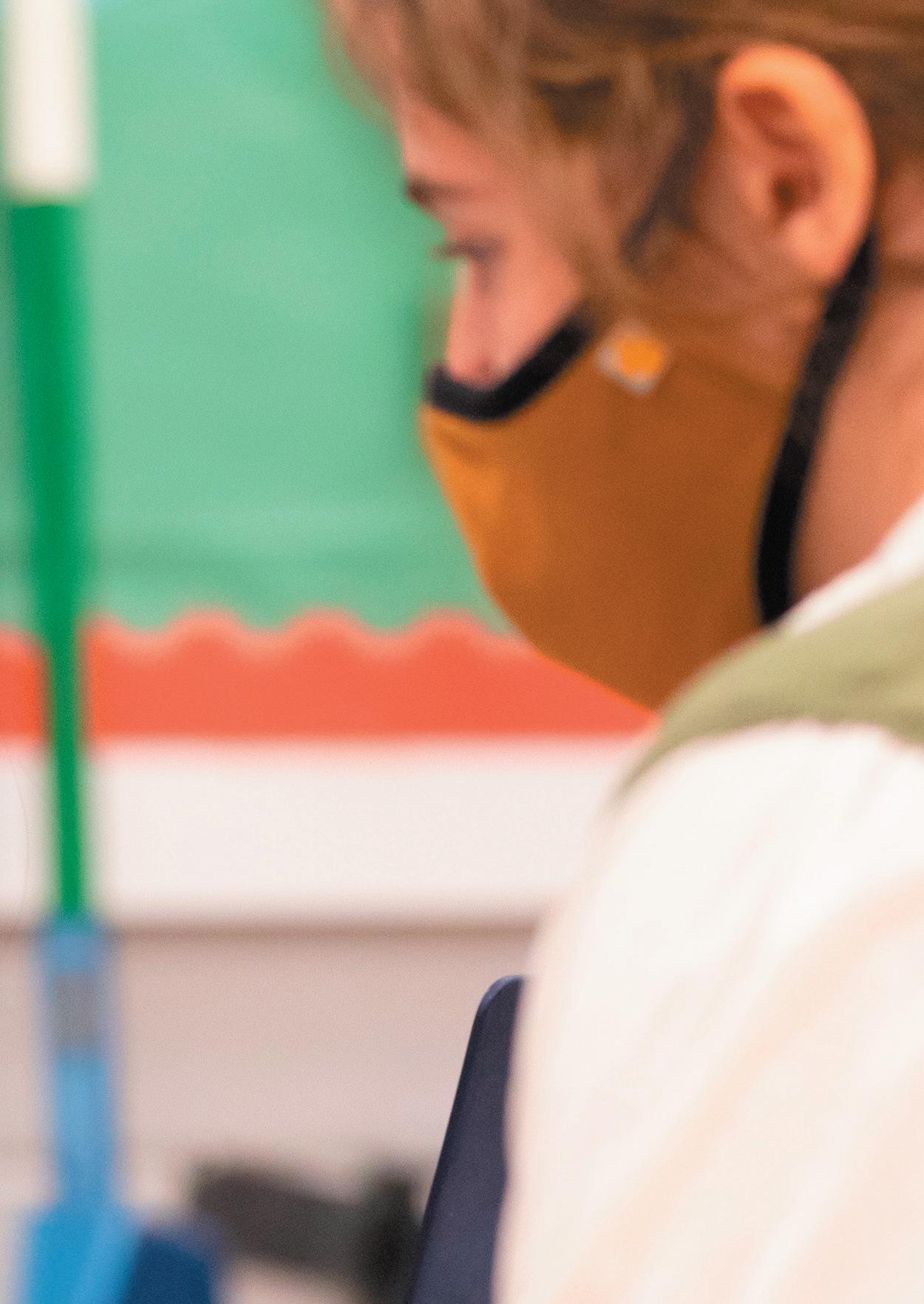
6 minute read
Addressing Challenges Facing Women and Girls through Engaged Research
Addressing CHALLENGES
facing WOMEN and GIRLS through ENGAGED
Advertisement
RESEARCH
In the workplace, in their homes, in schools, and in the larger community, women and girls face distinct challenges that reflect structural and systemic barriers of sexism, racism, classism, and other discrimination.
Three UTCSW faculty scholars are working to understand those barriers and identify and test means to challenge, mediate, and mitigate their influence. UTCSW Assistant Professor Kristen Ravi has spent much of her career focused on issues of intimate partner violence (IPV) and its effects on women. Ravi notes, “I became interested in women’s issues such as IPV because I saw the oppression that women face, and how that oppression is compounded based on the intersecting identities that women hold, such as race, socioeconomic status, immigration status, and sexual orientation.” In the wake of the pandemic, Ravi shifted her focus to better understand the impact of COVID-19 on survivors of intimate partner violence in their homes as well as their experience in shelters. Ravi found that the stay-at-home orders that began in March 2020 inevitably forced survivors of violence to remain confined
with their abusive partners for extended periods. This prolonged time spent together was dangerous for current and potential victims of IPV. Being trapped with an abusive partner both intensifies the isolation of survivors from social supports outside of their home and limits access to possible avenues for support or safety. It also potentially re-traumatized survivors who experienced trauma related to IPV or led to increased instances of IPV in the absence of access to safe shelters or key informal supports like friends or family members. Ravi is now embarking on a follow-up study examining the experiences of IPV survivors as well as the shelter staff during the beginning of year three of the pandemic. The study is the result of feedback from a local shelter director. As Ravi explains, “I shared the findings with the shelter leadership involved in the study, and one of the directors asked us to replicate our study. The shelter director wanted to know ‘if [the shelter] was doing any better.’ Now that we are in a new phase of the pandemic,” Ravi continued, “it is critical that we examine how survivors’ experiences may have changed as well as the experiences of IPV shelter staff.” This new study also focuses on mother’s experiences parenting while living in an IPV shelter during COVID-19. Ravi and colleague UTCSW Associate Professor Courtney Cronley are conducting a mixed-methods exploratory Kristen Ravi, study funded by the UT Professional and UTCSW Assistant Professor Scholarly Development Award in the Arts, Humanities, and Social Sciences, looking at maternal-child bonding within the context of living in an IPV shelter. The study has mothers complete an online daily diary for 14 weeks, reporting on their daily activities, levels of stress, and bonding with their child. In addition to the daily diary data, Ravi and Cronley will also conduct qualitative interviews with mothers to explore potential causal relationships among the daily diary data. “This is the first study to use these online diaries to explore the maternal-child bond within an IPV shelter,” Ravi said. “We are excited about this study because we know that having a strong maternal-child bond is essential to positive outcomes among children exposed to IPV. This pilot study will help us to develop an intervention to strengthen the maternal-child bond among survivors and their children within the IPV shelter or transitional housing setting.”
Cronley and Ravi have also turned their examination of life during the pandemic a little closer to home, looking at their own lives to identify strategies that can support women social scientists’ career success during COVID-19. The COVID-19 pandemic poses unforeseen risks to academic women’s career advancement. Women faculty are more likely to be grappling with new challenges related to caregiving and work-life balance, compared to their male colleagues, and may be facing more research obstacles due to the disruption of human-subjects data collection. “We described four strategies

that we have relied on to maintain career momentum,” Cronley explained. “Staying passionate, engaging in active mentorship, making virtual connections, and launching research in COVID. We conclude with recommendations for institutions of higher education to formalize specific policies to support gender and intersectional equity in career advancement.”
The team recommend more formalized and distinctly gender-informed mentor programs, professional development in utilization of emerging technology resources for research purposes, institutional training and support in leading interdisciplinary research teams, seed grants for racial and gender disparities research, and pro-family policies that provide financial supports and job security in the context of caregiving, as well as co-located campus childcare facilities.
As Cronley notes, “In revealing the extent of disparities in career opportunities and progression, the pandemic makes it starkly clear that the time for higher education to dismantle these structural gender and race disparities is now.”
One way to disrupt woman’s issues is to start when they are girls. UTCSW Assistant Professor Andrea Joseph-McCatty notes that, when looking at the national level, Black girls are the only group of girls disproportionally suspended from school. Joseph-McCatty describes that Black girls are more likely to be disciplined for subjective infractions, such as hair styles, clothing, and tone of voice, indicating that Black girls are uniquely subject to school discipline that can ultimately derail their futures. Biased action towards and negative portrayals of Black women and girls both increases their risk and exposure to adversity and creates an environment in which adversity is normalized and underacknowledged. Unfortunately, this can lead to unsupportive and even punitive school environments for Black girls. These trends are significant to disciplinary exclusion as girls often find themselves in confrontations that are related to violations of their bodies.
To protect girls who may be vulnerable to childhood adversities and inequitable discipline practices in school, Joseph-McCatty studies the use of school-based interventions such as trauma-informed practices and restorative justice practices to examine and reduce disproportional discipline disparities. Most recently, Joseph-McCatty has engaged in community-based research with organizations such as Gwen’s Girls Incorporated (Pittsburgh, PA) and The F.I.N.D design (Nashville, TN) to highlight and address the inequitable discipline practices leading to the disproportional suspension of Black girls from schools. Further, Joseph-McCatty suggests that schools must protect a student’s mental and physical well-being to support their academic performance. Schools committed to such practice should require policy and practice interventions that are anti-racist, trauma-informed, culturally relevant, and intersectional.
In her work on the use of restorative justice practices, Joseph-McCatty concludes that restorative practices need to be consistent and school-wide, thus training of school personnel and student leaders is essential. “Perhaps the most significant and complex barrier to the success of restorative practices is the failure to examine what drives racial inequity in school discipline,” Joseph-McCatty explained. “School leaders must be willing to begin the conversations around the topics of race and culture to have the chance to impact disparities and injustice.” This would require that school leaders be culturally informed and willing to confront racism within school walls. Inability to acknowledge and discuss racial and gender inequity leads to a haphazard introduction of change policy that can only result in the partial success of practices that have no chance of being fully realized. “Restorative practices can be transformative,” Joseph-McCatty notes, “but they must be given the chance to be effective first.”
And in addition to including race, class, gender and culture in school-based interventions, Joseph-McCatty argues that intervention work with and for Black girls must also be strengths-based. While researchers are often trained to take a problem-focused approach to intervention work, it is important to also acknowledge the strengths, talents, and dreams of Black girls. Failing to do so reduces their lived experiences to histories, inequitable systems, sexism, and racism—constructs the girls did not build nor should define them. Quoting Audre Lorde, Joseph-McCatty explains that “we must all be ‘deliberate and unafraid’ to truly engage in intervention work that leads to equity, healing, and a bright future for all Black girls.”
Deliberate and unafraid, the scholars at UTCSW pursue their research and intervention work to shape a brighter future for women and girls.







